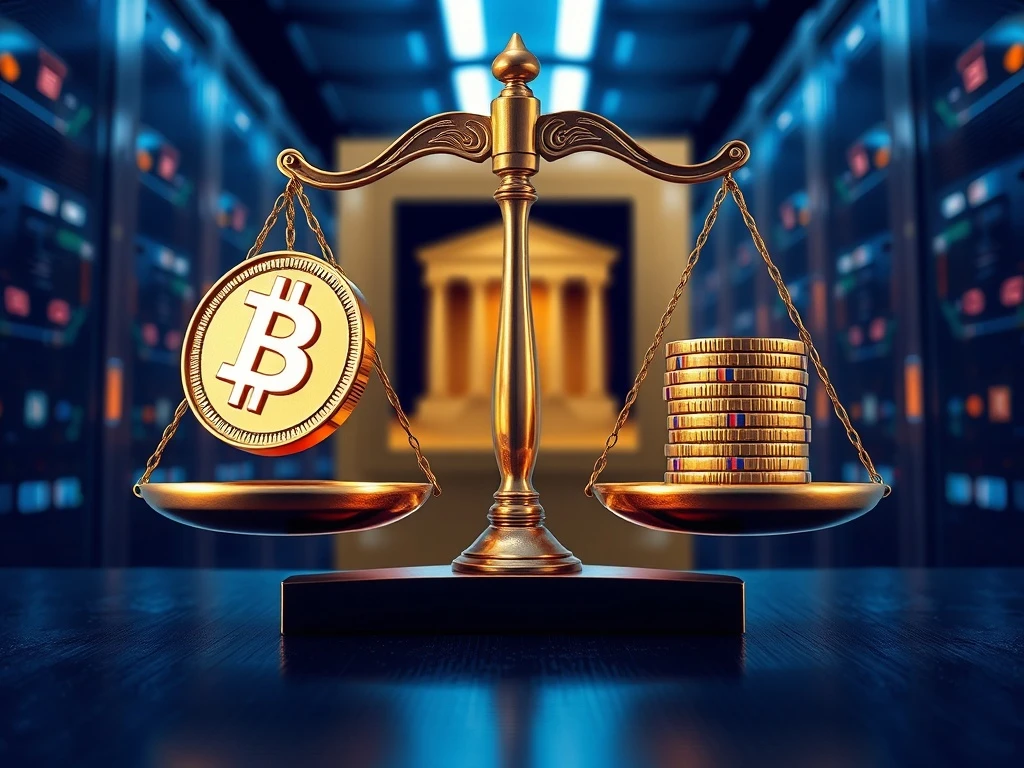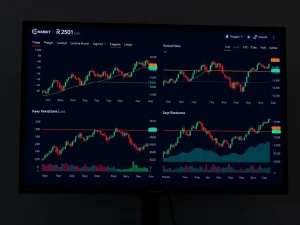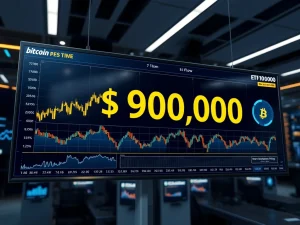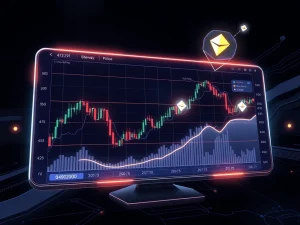Explosive Solana Lawsuit: Pump.fun and Jito Labs Accused in Alarming $5.5 Billion Meme Coin Gambling Scheme

A bombshell has just dropped in the crypto world, shaking the foundations of the Solana ecosystem. A revised class action lawsuit, filed in the Southern District of New York, has put Pump.fun and its key infrastructure partners — including Solana Labs, the Solana Foundation, Jito Labs, and the Jito Foundation — squarely in the crosshairs. The suit alleges a staggering $5.5 billion meme coin gambling scheme, drawing a direct parallel to unlicensed digital casinos. If you’re invested in Solana, follow meme coin trends, or simply care about the future of crypto regulation, this development demands your attention.
Unpacking the Allegations: The $5.5 Billion Meme Coin Gambling Scheme
At the heart of this legal challenge are accusations that Pump.fun operates not as a legitimate token launchpad, but as a “slot machine” designed to mass-produce tokens without any real transparency or investor safeguards. Led by Burwick Law, the lawsuit claims this environment enables speculative trading in a structurally rigged system, exploiting retail users through anonymous wallet access, bonding-curve pricing, and alleged insider trading. Estimated losses are cited between $4 billion and $5.5 billion, based on extensive on-chain transaction data.
The core of the complaint hinges on the Racketeer Influenced and Corrupt Organizations (RICO) Act, accusing defendants of running an illegal gambling enterprise and an unlicensed money transmission scheme. Beyond RICO, additional claims include:
- Wire fraud
- False advertising
- Offering unregistered securities
- Deceptive practices under New York consumer law
The plaintiffs argue that Pump.fun’s user-friendly interface, which allows anyone to launch a token for minimal cost, intentionally fosters a high-risk environment. This ease of creation, coupled with the lack of identity checks, creates fertile ground for pump-and-dump schemes and other exploitative practices. The lawsuit paints a picture of an ecosystem designed to extract maximum value from users, resembling the mechanics of a casino more than a financial market.
Jito Labs and Solana’s Alleged Complicity
Perhaps the most alarming aspect for the broader crypto community is the accusation that Solana and Jito Labs were not merely passive infrastructure providers. The lawsuit explicitly states they were active participants, profiting directly from the alleged scheme. How, you might ask, could major blockchain entities be implicated in a meme coin gambling operation?
- Solana Labs and Solana Foundation: The suit alleges these entities monetized user activity through blockspace fees generated by the high volume of transactions on Pump.fun. Furthermore, they are accused of benefiting from the appreciation of SOL, Solana’s native token, which saw increased demand due to the platform’s popularity.
- Jito Labs and Jito Foundation: Jito, known for its Maximal Extractable Value (MEV) tools and validator control, is accused of enabling front-running. This practice, where transactions are reordered to benefit insiders, can severely disadvantage retail traders and is a key concern in transparent markets. The lawsuit suggests Jito’s technology facilitated unfair trading advantages within the Pump.fun ecosystem.
The case names over a dozen defendants, including executives from the involved entities, highlighting Pump.fun’s meteoric rise to a $2 billion market cap following a $600 million token launch. This level of growth, the plaintiffs argue, underscores the scale of the alleged illicit activity.
The Broader Impact on Crypto Regulation
This **Solana lawsuit** is not an isolated incident; it reflects a growing trend of legal scrutiny against crypto projects. Burwick Law, the firm leading this action, has a history of targeting crypto platforms. They previously sued Pump.fun over the collapse of the PNUT meme coin and the $LIBRA token promoted by Argentina’s President Javier Milei, which resulted in a significant $58 million USDC freeze by a U.S. court. This track record underscores the increasing legal challenges faced by platforms facilitating speculative or unregulated trading.
Andrew Rossow, a public affairs attorney and CEO of AR Media Consulting, succinctly captured the essence of the challenge: “Permissionless doesn’t mean beyond reproach.” He emphasized that even infrastructure providers claiming neutrality could face legal exposure if their systems enable illicit activities. This statement is a stark warning to the entire decentralized finance (DeFi) space. The lawsuit questions the long-held notion that blockchain networks, by virtue of their permissionless nature, are immune from legal accountability for activities occurring on them.
The implications of this case are significant for the future of **crypto regulation**. If successful, it could set a precedent for holding blockchain infrastructure providers accountable for the activities of users on their networks. This would fundamentally challenge the idea of blockchain as a fully decentralized and unregulated space, potentially forcing platforms to implement stricter KYC (Know Your Customer) or AML (Anti-Money Laundering) measures, even for seemingly permissionless applications. The balance between fostering innovation and ensuring consumer protection is a tightrope walk for regulators, and cases like this will undoubtedly influence policy decisions.
What Does This Mean for Pump.fun and the Meme Coin Market?
Pump.fun’s simple interface made it a central hub for Solana’s on-chain activity, amplifying both its success and, now, its legal and reputational risks. The platform’s ability to rapidly launch tokens and create instant liquidity has been a double-edged sword, attracting both legitimate innovation and questionable practices. The allegations of a **meme coin gambling** scheme, if proven, would cast a long shadow over the entire meme coin market, which often thrives on speculation and community-driven hype rather than fundamental value.
While the allegations are serious, legal experts caution that the case remains untested in court. The U.S. legal system allows for broad claims in litigation, many of which may not withstand early motions to dismiss. However, the sheer scale of the alleged losses and the involvement of prominent entities like Solana and **Jito Labs** ensure that this lawsuit will be closely watched. It highlights the growing concerns about the role of blockchain networks in speculative trading ecosystems, where low barriers to entry and anonymity create fertile ground for exploitation.
As the crypto industry grapples with balancing innovation and accountability, legal challenges like the one against Pump.fun and Solana may well shape the future of decentralized finance and meme coin trading. The defendants have not yet publicly responded to the allegations, but their eventual response will be critical in understanding the path forward for this groundbreaking case. The outcome could redefine the responsibilities of blockchain developers and network participants, ushering in a new era of accountability in the digital asset space.
Frequently Asked Questions (FAQs)
1. What is the main accusation in the amended RICO lawsuit against Pump.fun and Solana?
The lawsuit alleges that Pump.fun, along with Solana Labs, the Solana Foundation, Jito Labs, and the Jito Foundation, orchestrated a $5.5 billion meme coin gambling scheme. It claims Pump.fun operates as an unlicensed digital casino, enabling speculative trading in a rigged environment that exploits retail users.
2. How are Solana and Jito Labs allegedly involved in the scheme?
The lawsuit claims Solana Labs and the Solana Foundation profited through blockspace fees from Pump.fun’s high transaction volume and the appreciation of the SOL token. Jito Labs is accused of enabling front-running via MEV tools and validator control, allowing insiders to gain unfair advantages in trading.
3. What is the RICO Act, and why is it being invoked?
The Racketeer Influenced and Corrupt Organizations (RICO) Act is a federal law designed to combat organized crime. It’s being invoked because the lawsuit alleges the defendants engaged in an ongoing pattern of criminal activity, including running an illegal gambling enterprise and an unlicensed money transmission scheme, alongside other claims like wire fraud and offering unregistered securities.
4. What are the potential implications of this lawsuit for the broader crypto industry?
If successful, this lawsuit could set a significant precedent for holding blockchain infrastructure providers accountable for activities on their networks. It challenges the notion of blockchain as a fully decentralized and unregulated space, potentially leading to increased regulatory scrutiny, demands for greater transparency, and a re-evaluation of legal liabilities for permissionless platforms.
5. Has Pump.fun faced legal challenges before?
Yes, Burwick Law, the firm leading this current lawsuit, has previously sued Pump.fun over the collapse of the PNUT meme coin and the $LIBRA token, which resulted in a $58 million USDC freeze. This indicates a pattern of legal scrutiny against the platform.






